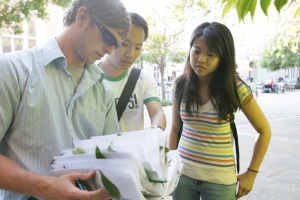The Center for Community Engagement supports individual faculty and academic units at all stages of community-engaged curriculum development and implementation. In doing so, we aid our campus partners in fulfilling the Chancellor’s priority for Civic Engagement to provide students with learning experiences and research opportunities that are relevant to their fields of study and create value for our community partners.
Our Framework: What is a Community-Engaged Course?
UCLA’s approach to community-engaged teaching and learning draws heavily on the Carnegie Foundation’s definition of community engagement as “teaching, learning, and scholarship that engages faculty, students, and community in mutually beneficial and respectful collaboration. Their interactions address community-identified needs, deepen students’ civic and academic learning, enhance community well-being, and enrich the scholarship of the institution.”
In April 2020, the Academic Senate’s Undergraduate Council approved a new, flexible and expansive framework for community-engaged courses, replacing the 2008 narrowly-defined “service-learning course” framework. The new framework lays out four principles that should guide community-engaged teaching and learning at UCLA:
Community-engaged teaching can take many different forms depending on the learning goals for a particular course, the departmental context, and the aims of the community partnership. UCLA faculty currently employ the following strategies in their community-engaged teaching (this list is not exhaustive):
COMMUNITY-ENGAGED RESEARCH
Students apply their academic skills to conduct research in collaboration with one or more community partners.
CO-LEARNING
Students and community constituents learn together in courses based at UCLA or in a community location in Los Angeles or through travel study programs.
SERVICE DELIVERY
Students support the delivery of programs or services to constituents being served by a community organization, bringing these experiences back into the classroom to inform course material.
K-12 AND COMMUNITY EDUCATION
Students develop and lead lessons in school-based, afterschool or community programs.
CLIENT CONSULTING
Students apply the skills of their discipline to address needs or challenges identified by community stakeholders.
CO-CREATING
Students and community constituents engage in creative or artistic work together based at UCLA or in a community location.
ORGANIZATIONAL CAPACITY BUILDING
Students work to support the mission of a community organization through activities such as curriculum development, translation services, website design, and data analysis.
Why does UCLA designate community-engaged courses with a special suffix? Why “XP”?
Although community-engaged courses are not required for general education graduation requirements at UCLA, such courses contribute significantly to fulfilling the core public mission of the university. In addition, such courses contribute to communicating the importance of civic dispositions, knowledge, and action to our students. These are among the principal reasons that UCLA calls attention to community-engaged courses through a designated course suffix.
Furthermore, the XP suffix for community-engaged courses makes it easier for students to find community-engaged courses in the catalog and schedule of classes. It also allows UCLA to identify the broad range of faculty, departments and specific courses that connect with community partners. Using the course suffix for community-engaged courses helps ensure UCLA can recognize and champion the many faculty who teach such courses. In fact, the UCLA Center for Community Engagement is preparing to launch a new “Collaboratory” website that will feature UCLA faculty and their students working with community partners. A search function will make it possible to find faculty and departments, community partners, the specific collaborative work products and activities, as well as areas of focus, populations engaged and locations.
We chose “XP” for eXPeriential, and because our first choice the letters “CE” already appear in other course suffixes.
How We Can Support Your Teaching
The Center for Community Engagement supports individual faculty members and academic units with all stages of course development and implementation, and can help connect instructors with community organizations that are interested in partnering on courses and research projects. The Center’s staff is available to consult with instructors to explore models of community-engaged teaching that best suit learning goals for courses at all levels of the curriculum, from introductory classes to advanced electives and capstones across the disciplines.
Contact Center Director Dr. Shalom Staub to schedule a consultation with the Center for Community Engagement.


